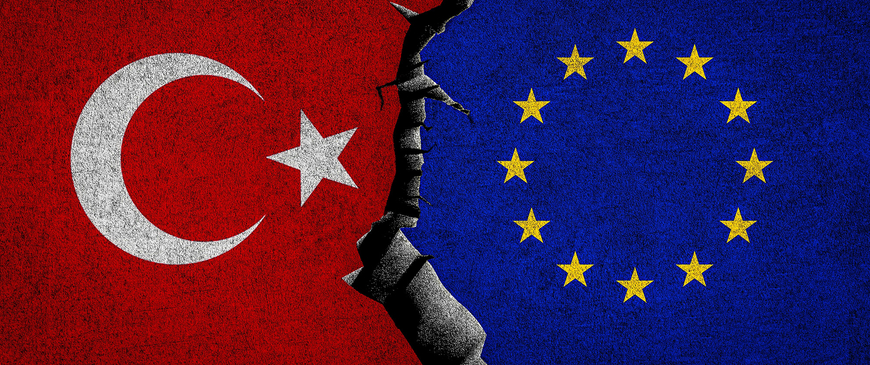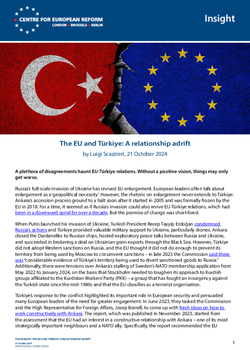
The EU and Türkiye: A relationship adrift
A plethora of disagreements haunt EU-Türkiye relations. Without a positive vision, things may only get worse.
Russia’s full-scale invasion of Ukraine has revived EU enlargement. European leaders often talk about enlargement as a ‘geopolitical necessity’. However, the rhetoric on enlargement never extends to Türkiye: Ankara’s accession process ground to a halt soon after it started in 2005 and was formally frozen by the EU in 2018. For a time, it seemed as if Russia’s invasion could also revive EU-Türkiye relations, which had been in a downward spiral for over a decade. But the promise of change was short-lived.
A plethora of disagreements haunt EU-Türkiye relations. Without a positive vision, things may only get worse.
When Putin launched his invasion of Ukraine, Turkish President Recep Tayyip Erdoğan condemned Russia’s actions and Türkiye provided valuable military support to Ukraine, particularly drones. Ankara closed the Dardanelles to Russian ships, hosted exploratory peace talks between Russia and Ukraine, and succeeded in brokering a deal on Ukrainian grain exports through the Black Sea. However, Türkiye did not adopt Western sanctions on Russia, and the EU thought it did not do enough to prevent its territory from being used by Moscow to circumvent sanctions – in late 2023 the Commission said there was “considerable evidence of Türkiye’s territory being used to divert sanctioned goods to Russia.” Additionally, there were tensions over Ankara’s stalling of Sweden’s NATO membership application from May 2022 to January 2024, on the basis that Stockholm needed to toughen its approach to with Kurdish groups affiliated to the Kurdistan Workers' Party (PKK) – a group that has fought an insurgency against the Turkish state since the mid-1980s and that the EU classifies as a terrorist organisation.
Türkiye’s response to the conflict highlighted its important role in European security and persuaded many European leaders of the need for greater engagement. In June 2023, they tasked the Commission and the High Representative for Foreign Affairs, Josep Borrell, to come up with fresh ideas on how to work constructively with Ankara. The report, which was published in November 2023, started from the assessment that the EU had an interest in a constructive relationship with Ankara – one of its most strategically important neighbours and a NATO ally. Specifically, the report recommended the EU should restart the high-level dialogues with Türkiye that had been paused due to bilateral tensions. It also recommended proceeding with the planned upgrade of the customs union to include services, agriculture and public procurement, if Ankara acted constructively on resolving the Cyprus dispute. Finally, the report suggested the EU should work towards streamlining the visa application process for some Turkish citizens, such as businesspeople and students.
On paper, this was a constructive agenda that could move relations forward. Some high-level dialogues have resumed, notably the one on trade, and that has resulted in concrete progress in resolving some of the trade ‘irritants’ that have been undermining the functioning of the customs union: as of July, 15 of 26 of these had been solved. And in August, Turkish Foreign Minister Hakan Fidan attended an informal meeting of EU foreign ministers for the first time in five years. However, there is still much opposition to starting customs union negotiations among member-states.
Three sets of issues continue to impede progress. The first is the Cyprus problem and Türkiye’s troubled relationship with Greece. Once Cyprus joined the EU in 2004, the Union acquired a member-state locked into a decades-long dispute with Türkiye. Ankara refuses to recognise Cyprus and supports the separatist Turkish Republic of Northern Cyprus – a state that only it recognises. UN-led attempts to reunify the island have failed to lead to a breakthrough. In recent years, Türkiye has abandoned its previous support for reunification and tried to strengthen the North’s position. In parallel, since the early 2010s, Ankara has sent ships off the coast of Cyprus to assert claims to a large maritime zone near the island, and the natural gas deposits it contains. Ankara’s relationship with Greece has also been a frequent source of friction with the EU. Greece and Türkiye disagree over the delimitation of their airspace and national waters, and Türkiye claims sovereignty over certain Greek islets in the Aegean. These disputes have repeatedly brought Athens and Ankara to the brink of open conflict – most recently in 2020.
The second issue is Türkiye’s democratic backsliding and the state of human rights in the country. When Ankara began its EU accession negotiations, democratic freedoms were improving. Many Europeans saw Erdoğan as a reformer, committed to advancing Ankara’s EU membership and willing to take on the country’s powerful military. But, after successfully reducing the military’s sway, Erdoğan began to consolidate power in the early 2010s. A failed coup in 2016 prompted an intensified crackdown on dissent that the European Commission criticised as disproportionate. The EU regularly voices concern about the condition of human rights and democratic freedoms in Türkiye – including the “targeting of political parties, human rights defenders and media".
The third issue is the growing number of disagreements on foreign policy between Ankara and Brussels. Many European policy-makers view Turkish foreign policy as threatening and antagonistic. Türkiye’s deepening ties to China and Russia are seen as a particular problem. For example, Ankara has applied to join the BRICS group of countries and said it wants to join the Sino-Russian Shanghai Co-operation Organisation. Türkiye has also bought a Russian S-400 air defence system, which NATO allies argue is incompatible with the alliance’s air defences. Ankara’s military operations in Syria and Libya, and its support for Azerbaijan’s offensive on Nagorno-Karabakh in 2023, have also led to tensions with many EU countries (and with the US). As a result of poor relations, European countries increasingly see Türkiye as a competitor to the EU in the Western Balkans, Central Asia and Africa – all regions where Ankara has sought to increase its economic and diplomatic influence.
Many EU policy-makers view Turkish foreign policy as threatening and antagonistic. Türkiye’s ties to Russia are seen as a particular problem.
These three sets of obstacles re-assert themselves whenever external events push Brussels and Ankara closer together. In 2016, the migration crisis prompted European leaders to turn to Ankara for help. In exchange for Türkiye’s co-operation, the EU offered billions in funding to help look after the 2.7 million Syrian refugees then in the country. It also promised visa-free travel for Turkish citizens and an upgrade of the customs union. The refugee funding element of the agreement has broadly held, with the EU providing Turkey with €6 billion dedicated to supporting refugees since 2016. But tensions between Türkiye and Greece and Cyprus, Türkiye’s domestic situation and its foreign policy meant that the rest of the agenda never got off the ground. By 2018, relations deteriorated to the point that the EU officially froze accession talks. The freeze became even deeper in 2019-2020, when the EU cancelled its high-level dialogues with Ankara, reduced pre-accession financial assistance and sanctioned some Turkish officials for Ankara’s drilling in the eastern Mediterranean.
The difficulty in making positive progress tempts some Europeans to think matters would be easier if the EU abandoned the accession framework and sought to build a partnership with Türkiye focused on co-operation in areas such as energy, foreign policy and migration. In practice, that is what the EU has already been trying to do. Migration co-operation is not connected to accession, with the Union providing financial support to refugees in Türkiye and funding Ankara’s efforts to harden its borders. The project for modernising the customs union is detached from accession, as are the other ideas for reviving the relationship contained in the Borrell/Commission report of last year.
Explicitly dropping accession is unlikely to help. Abandoning accession might diminish the friction caused by the EU's concerns on the state of democracy and human rights in Türkiye. But it would not remove the tensions caused by the unresolved Cyprus question or by broader foreign policy disagreements. It would also do nothing to address the trade tensions that are likely to stem from the implementation of the EU’s carbon border adjustment mechanism, which will hit Ankara hard. At the same time, abandoning accession would likely have the effect of making Turkish society, which still favours EU membership, more anti-Western. Above all, ending the accession process would almost certainly be irreversible, as starting it anew would require all member-states to agree. Ultimately, ending Türkiye’s accession bid would only close off options in case of political change in Ankara.
The alternative to the EU’s current passive approach would be a more forward-leaning one that aims to manage differences with Ankara while trying to maintain and deepen co-operation in selected areas – the essence of last year’s Borrell/Commission report. EU leaders should revive those proposals. It is in the Union's interest to restart all high-level dialogues, not least to identify opportunities for any alignment of policies. The mutual economic interest in upgrading the customs union is obvious. But there are also areas of potential co-operation in foreign policy: Ankara does not want a Black Sea in which Russia is dominant, a Central Asia under China's thumb or a Middle East on fire. The Union could open negotiations on upgrading the customs union without preconditions, making the conclusions of talks conditional on the condition of democratic freedoms in Türkiye and on resolving the Cyprus dispute. While there are no guarantees, a credible promise of economic benefits could shape Erdoğan’s calculus on issues such as helping the EU tackle Russian sanctions circumvention, encouraging Turkish Cypriots to alter their stance on the island’s reunification, and continuing the recent détente with Greece.
Without a positive vision, EU-Türkiye relations will continue to drift.
The chances of a breakthrough are slim. But, without a positive vision, EU- Türkiye relations will continue to drift. Additionally, the status quo is less sustainable than it looks. Trade could become less of an anchor: while the EU and Türkiye have addressed some of the trade irritants in the customs union, other issues remain, and relations may be further strained as the EU tilts towards industrial policy and protectionism. Migration co-operation is more fragile than it looks: most Turks resent their country being a holding pen for refugees and Ankara has been trying to repatriate as many Syrians as possible – which could generate tensions with the EU. At the same time, Türkiye will continue to pursue a foreign policy that most EU members see as a challenge. The potential for flare-ups in areas such as Ankara’s relations with Russia, or its policy in the Eastern Mediterranean and the Middle East, will remain high. Most worryingly, ordinary Turks are likely to grow increasingly disillusioned with the EU. If that happens, then even political change in Ankara would probably not be enough to revive the relationship.
Luigi Scazzieri is a senior research fellow at the Centre for European Reform.


Add new comment